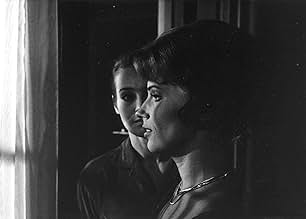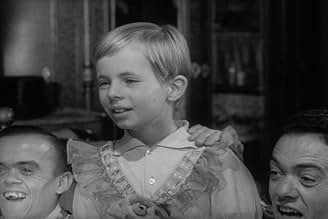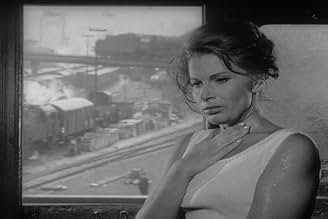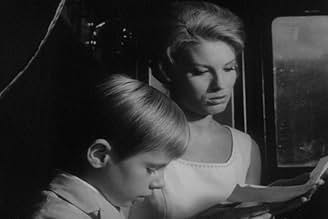Dos hermanas distanciadas, Ester y Anna, y el hijo de diez años de Ana, viajan a un país centroeuropeo al borde de la guerra. Ester enferma gravemente y los tres se trasladan a un hotel de u... Leer todoDos hermanas distanciadas, Ester y Anna, y el hijo de diez años de Ana, viajan a un país centroeuropeo al borde de la guerra. Ester enferma gravemente y los tres se trasladan a un hotel de un pequeño pueblo llamado Timoka.Dos hermanas distanciadas, Ester y Anna, y el hijo de diez años de Ana, viajan a un país centroeuropeo al borde de la guerra. Ester enferma gravemente y los tres se trasladan a un hotel de un pequeño pueblo llamado Timoka.
- Dirección
- Guión
- Reparto principal
- Premios
- 3 premios y 2 nominaciones en total
- Woman in Variety Hall
- (sin acreditar)
- The Paperboy
- (sin acreditar)
- Man in Variety Hall
- (sin acreditar)
- Impressario
- (sin acreditar)
- The Bar Owner
- (sin acreditar)
- The Doorkeeper
- (sin acreditar)
- Anna
- (sin acreditar)
- The Cashier
- (sin acreditar)
- The Old Man
- (sin acreditar)
Reseñas destacadas
The first is the theological/existential perspective. Contrary to many published reviews on the trilogy, I find the three films affirm the existence of God in the face of doubt. What is the silence referring to? God appears to be quiet; yet the ailing Ester communicates with her nephew by providing him a piece of paper with a foreign word "hadjek" that means "soul" or "spirit". Is that a word that a woman disillusioned with existence of God would pass on to her nephew on her deathbed? I have doubts about Bergman's professed agnosticism. "Hadjek" is the last word of The Silence spoken by Johan reading from the list of foreign words from Ester's letter to him that he jealously guards from his own mother Anna. Somewhat like "rosebud" in Citizen Kane. Again there are two shots towards the end of The Silence that offer Christian symbolism affirming faith in God. First, there is the last shot of Ester her face directed at light from the window, fully exposed to light, as she waits for her eventual death, content at having passed on the letter to her nephew. The second is the last shot of Anna her bathing her face in rainwater (a symbol of baptism) having read the contents of the letter that Johan holds in his hands.
Now Bergman gave names to his film's characters with considerable thought, incorporating Biblical connections that he probably picked up from his father's sermons. The priest Tomas in Winter Light is so named because St Thomas doubted the resurrection of Christ, just as Tomas is questioning the existence of God. Ester in The Silence is obviously named after the Biblical book Esther, one of the only two books in the Bible that does not mention God directly. Does the absence of God mean the book is not holy? By corollary, does the silence of God mean that God does not exist? For the atheist viewer of The Silence, too, there is sufficient room to record the director's observation of deserted churcheswhen Anna truthfully confesses to her elder sister that she had sex with a waiter in an empty church. For the existentialist viewer, there is silence from God to the cries of help from Ester. Yet another way to appreciate The Silence is to study the physical silence in the film. Spoken words are indeed few. The film begins with the tick-tock of a watch/clock, which stops when the characters break their silence. The watch is also a metaphor for the limited time of life on earth available for each individual. The sound of the tick-tock increases when Ester is unable to breath and is mortally afraid of dying from suffocation. It is also heard when Anna is reflecting on her post-coital satisfaction in her hotel room. Words are fewthe foreign words learnt in the unnamed country relate to "hand", "face" and finally "soul". Much of the visual communication relates to "hands" and "faces", particularly those of Ester. Ester's hands move even when she is sleeping. Ester's hand caresses Anna's hair but stops short of touching the face. The denizens of the unnamed country hardly speak, yet we know all is not well, with tanks moving in the night and underfed horses pulling carts of furniture to nowhere. Death seems around the corner. One of the few other sounds we hear is the click of the toy gun, disturbing the cleaner of the chandelier. Then there is the clank of the tank negotiating the narrow street outside the hotel. More importantly, silence in the film between individual characters in the film, existing side by side with the theological silence.
A third way to evaluate complex issues of The Silence is to study the camera-work of Sven Nykvist. Much of the brilliance of the black-and-white film revolves around shadows and light, mirrors and last but not the least, close-ups. The carnal events are captured in shadows, while epiphanies are swathed in bright light. Nykvist and Bergman use mirrors to indicate the lack of direct communication or rather the presence of bounced communication. When Ester, the translator of languages cannot converse with the maitre d'hotel, she resorts to sign languageeven the boy Johan prefers Punch and Judy to communicate his feelings rather than read a book for his sick aunt. The extraordinary performance of one of cinema's finest actresses, Ingrid Thulin, would have been difficult to perceive were it not for Nykvist's close-ups of her face and hands.
A fourth way to approach The Silence is the character of the young boy Johan, who probably is the personification of the young Bergman. Johan is a mix of irreverence (he urinates in the hotel corridor) and innocence (he willingly cross-dresses at the behest of the dwarfs). He is attached to his mother, but respects his aunt even more. As the film un-spools, it is evident that he obeys his mother but is able to connect with the aunt's higher level of intellect, quite aware that she is dying. Johan's father exists but is not physically present. Johan is figuratively squeezed between his mother lacking a "conscience" and an aunt with a domineering and an implied lesbian relationship with his own mother. It is not a perfect life for a boy. Indirectly, Bergman wants the viewer to step into Johan's shoes, irreverent yet innocent and loving. Johan is first introduced to death by the personal collection of family photographs of the maitre d'hotel, including photographs of his dead wife. But John prefers to hide them beneath the carpet but resurrects the subject in his own Punch and Judy show for his aunt.
Then you can look at The Silence as the quintessential Ingrid Thulin film. In The Silence her facial expressions are the very imprints one associates with Peter O'Toole's thespian turns in cinema. It is no wonder that she acted in films of topnotch directors: Bergman, Visconti, Resnais and Minnelli.
The film also has one or two monumental pieces of cinematography - not least the scenes with the small boy in the large lobby of the hotel - far more effective in this film than in the "tribute use" by Kubrick in the Shining many years later. The shots of tanks rolling through the unnamed Southern European town will stick in my mind for a long time.
Ingrid Thulin and Gunnel Lindblom were two of Bergman's best women and he works with them to terrific effect in this movie.
This is one of the great movies - highly recommended.
Ester, Anna and Johan are in a city whose language they don't understand and no one understands their language. Isolation, silence.
There's something surreal, almost buñuelesque, in "The Silence". Johan sees and feels many things, but he can't really understand them. The train is arriving in the city and Johan stares out of the train window - he sees many war tanks heading somewhere. He doesn't know what to do with himself... he wanders through the corridors of the hotel in which they are staying and he meets midgets from a wandering troupe. The relationship between the two sisters, Anna (his mother) and Ester (once so strong and now so very sick) is growing tenser. Johan tries to understand, walks along the hotel corridors, plays... he tries to lean on someone.
We see through the eyes of Johan (chaos and the search for love) and Anna (rebellion, desire, the search for something/someone) and Ester (fear and hope succeeding each other).
Ester, Anna and Johan - they are together but so very far apart. Johan, Anna's little son, is the only one that wants to establish a real connection, but when the film ends, he has already begun to suspect what life's about - the first steps to a rude awakening.
There are not many films like "The Silence". This film is really what could be called a masterpiece. It is very difficult for me to describe "The Silence" and the feelings/emotions it provoked in me. All I can say that it is a very rich film and each viewing will reveal new things and different angles to the viewer. "The Silence" is cinematic art in its purest form.
Often referred to as the third in a trilogy, it is more profoundly the third in a sequence of three world class pieces of cinema, as the emotions and frustrations of Ester (Ingrid Thulin) carry the viewer over a threshold of uncertainty, inconclusiveness, bewilderment and confusion - with Gunnel Lindblom as Anna playing her part to perfection too - but don't ask me why, because the gaps reach to the sky.
The film may be viewed on several levels -as the story of two sisters who apparently used to be close but are not able to communicate and understand one another anymore. Or it can be interpreted as a parable of Sensuality, Intellect, and Innocence, that cannot coexist in the world where God does not exist. As with every great and intelligent work of art, "The Silence" has so much to offer to its viewer, it's got so many questions to ask and it does not provide the easy answers.
Complex, suffocating, screaming through the silence, poignant, passionate, harrowing yet strangely hopeful and even funny sometimes - this is an unforgettable film, a masterpiece, a hidden treasure that has to be rediscovered and to receive as much praise and admiration as "Persona" and "Cries and Whispers" - for both of which "The Silence" was an inspiration. The acting by two Bergman's actresses is a miracle (as usual) as well as Sven Nykvist's camera work in creating the claustrophobic world where silence cries, whispers, and kills...
¿Sabías que...?
- CuriosidadesThe language in the movie is Gun Grut Bergman's creation. She was a translator and linguist in Slavic languages. The name of the city, which is indicated first in the train's speaker, and then by Anna, as Timoka, is a real word however. Bergman found it in a book in Estonian on the bookshelf of his wife Käbi Laretei. When he asked what it meant, she replied "belonging to the hangman".
- Citas
Ester: I didn't want to accept my wretched role. But now it's too damn lonely. We try out attitudes and find them all worthless. The forces are all too strong. I mean the forces... the horrible forces. You need to watch your step among all the ghosts and memories.
Ester: All this talk... There's no need to discuss loneliness. It's a waste of time.
- Versiones alternativasThe original UK cinema release featured the pre-edited US print which was then cut by a further 35 secs by the BBFC to shorten some shots of Ester stroking Anna's hair and to replace subtitled references to erections and semen. The 1999 Tartan video is the complete version.
- ConexionesEdited into Journal d un père (2023)
- Banda sonoraGoldberg Variations, BWV 988 - Variatio 25
Music by Johann Sebastian Bach
Selecciones populares
- How long is The Silence?Con tecnología de Alexa
Detalles
Taquilla
- Recaudación en todo el mundo
- 14.199 US$
- Duración1 hora 36 minutos
- Color
- Relación de aspecto
- 1.37 : 1
Contribuir a esta página




























